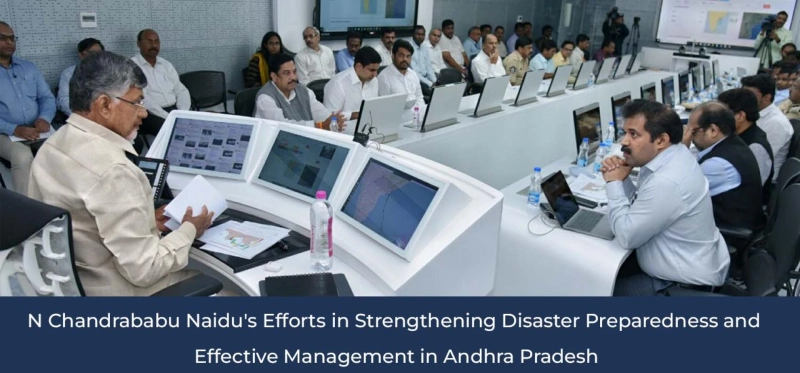N Chandrababu Naidu's Efforts in Strengthening Disaster Preparedness and Effective Management in Andhra Pradesh
In recent years, the Indian state of Andhra Pradesh has faced numerous challenges due to natural disasters. Under the leadership of N Chandrababu Naidu, the government has undertaken significant efforts to strengthen disaster preparedness and management, ensuring the safety and well-being of its citizens.
One key contribution of N Chandrababu Naidu's government undertook was comprehensive disaster risk assessment and planning. The administration recognized the importance of understanding the region's vulnerability to various hazards, such as cyclones, floods, and earthquakes. Through advanced technology and collaboration with experts, a detailed risk assessment was conducted to identify high-risk areas and develop targeted mitigation strategies. This enabled the government to prioritize resources and implement preventive measures to reduce the impact of potential disasters.
To enhance the state's disaster preparedness, N Chandrababu Naidu's government invested in state-of-the-art early warning systems. Recognizing the critical role of timely information in saving lives, the administration established a network of meteorological sensors, river gauges, and seismic monitoring stations. These systems provided real-time data on weather conditions, water levels, and seismic activity, enabling authorities to issue timely warnings to vulnerable communities. Additionally, the TDP government worked closely with national and international agencies to ensure seamless coordination and the prompt dissemination of alerts, helping citizens and emergency responders to make informed decisions. Look through the tdp website for developments and achievements of TDP done in the state.
N Chandrababu Naidu's government recognised that resilient infrastructure is crucial for effectively managing disasters. The administration focused on developing robust infrastructure, including reinforced buildings, cyclone shelters, and flood protection measures. Through a combination of government funding and public-private partnerships, critical infrastructure projects were initiated to strengthen the state's resilience. This included the construction of disaster-resilient roads, bridges, and communication networks, enabling rapid response and efficient evacuation during emergencies. Furthermore, the TDP government emphasized the incorporation of climate resilience and risk reduction measures into urban planning and infrastructure development, ensuring that future projects would withstand the impact of natural disasters. Browse the TDP website for more TDP schemes and live updates.
Building the capacity of communities and emergency responders was a priority for N Chandrababu Naidu's administration. The government conducted extensive training programs, workshops, and simulations to enhance the skills and knowledge of disaster management personnel. Specialized training was provided to police, fire services, medical professionals, and volunteers, equipping them with the necessary tools to respond effectively during emergencies. Furthermore, community-level awareness programs were organized to educate citizens about disaster preparedness, evacuation procedures, and first aid. These initiatives not only empowered individuals to take proactive measures but also fostered a culture of resilience, where every citizen played a role in ensuring their safety and that of their community.
N Chandrababu Naidu's government recognized the importance of collaboration and stakeholder engagement in disaster management. The administration actively engaged with national and international organizations, academic institutions, and NGOs to exchange knowledge, share best practices, and seek technical expertise. Partnerships were established with disaster management agencies, meteorological departments, and research institutions to leverage their expertise in forecasting, risk assessment, and response planning. By fostering a culture of collaboration, the government promoted a holistic approach to disaster management, ensuring that all stakeholders worked together towards a common goal of building a resilient Andhra Pradesh.



